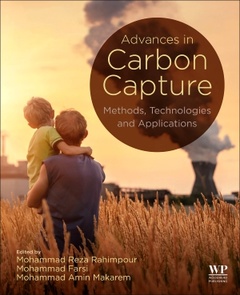Advances in Carbon Capture Methods, Technologies and Applications
Coordonnateurs : Rahimpour Mohammad Reza, Farsi Mohammad, Makarem Mohammad Amin

Advances in Carbon Capture reviews major implementations of CO2 capture, including absorption, adsorption, permeation and biological techniques. For each approach, key benefits and drawbacks of separation methods and technologies, perspectives on CO2 reuse and conversion, and pathways for future CO2 capture research are explored in depth. The work presents a comprehensive comparison of capture technologies. In addition, the alternatives for CO2 separation from various feeds are investigated based on process economics, flexibility, industrial aspects, purification level and environmental viewpoints.
Section I: Introduction to CO2 Capture 1. CO2 emission sources, greenhouse gases and global warming effect 2. Challenges on CO2 capture, reuse and conversion
Section II: Absorption Techniques and Methods for CO2 Capture 3. CO2 absorption by common solvents 4. CO2 absorption by ionic liquids and deep eutectic solvents 5. CO2 capture by solvents modified with nanoparticles 6. Encapsulated liquid sorbents for CO2 Capture 7. CO2 capture by Lewis acids and amino acid salts 8. Advances in gas-liquid contactors for carbon capture and challenges in industrialization: packed bed, rotating packed bed, mini and microchannels
Section III: Adsorption Techniques for CO2 Capture 9. CO2 adsorption by carbonaceous materials and nanomaterials 10. CO2 adsorption by conventional and nano-sized zeolites 11. Application of metals, pseudo metals and metal-organic framework (MOF) for capturing CO2 12. CO2 adsorption by functionalized sorbents 13. Advances in CO2 adsorption in swing technologies and challenge on industrialization 14. Phase-change absorption and Processes for CO2 Capture
Section IV: CO2 Capture by Membrane Separation 15. CO2 separation with ionic liquid membranes 16. Zeolite and Alumina based membranes for CO2 capture 17. Polymeric membranes for CO2 separation 18. An Overview of Gas-Liquid Hollow Fiber Polymeric Membrane Contactor for CO2 Absorption-Stripping 19. MOF mixed matrix membranes for CO2 separation 20. Challenges on industrialization of CO2 Capture by Membrane
Section V: Biological techniques for CO2 capture 21. CO2 capture using microalgae 22. CO2 capture using enzymes 23. CO2 capture using bacteria 24. Challenges on industrialization of biotechnological CO2 capturing techniques
Section VI: Applications of CO2 Capture 25. CO2 removal from biogas and syngas 26. CO2 removal from natural gas 27. Integration of CO2 capture and conversion 28. CO2 removal from flue gas 29. CO2 removal from air
Researchers seeking new methods and technologies in carbon capture from energy, environmental, chemical engineering backgrounds. These include academic researchers (students, professors, lab technicians, and etc.) and researchers in R&D departments. Engineers working on process design and development. Oil and Gas refineries. Research and Development Groups in chemical plants. CO2 consumption and production units in petrochemical plants
Prof. Mohammad Reza Rahimpour is a professor in Chemical Engineering at Shiraz University, Iran. He received his Ph.D. in Chemical Engineering from Shiraz University joint with University of Sydney, Australia 1988. He started his independent career as Assistant Professor in September 1998 at Shiraz University. Prof. M.R. Rahimpour, was a Research Associate at University of California, Davis from 2012 till 2017. During his stay in University of California, he developed different reaction networks and catalytic processes such as thermal and plasma reactors for upgrading of lignin bio-oil to biofuel with collaboration of UCDAVIS. He has been a Chair of Department of Chemical Engineering at Shiraz University from 2005 till 2009 and from 2015 till 2020. Prof. M.R. Rahimpour leads a research group in fuel processing technology focused on the catalytic conversion of fossil fuels such as natural gas, and renewable fuels such as bio-oils derived from lignin to valuable energy sources. He provides young distinguished scholars with perfect educational opportunities in both experimental methods and theoretical tools in developing countries to investigate in-depth research in the various field of chemical engineering including carbon capture, chemical looping, membrane separation, storage and utilization technologies, novel technologies for natural gas conversion and improving the energy efficiency in the production and use of natural gas industries.
Dr. Mohammad Farsi is an associate professor in Chemical and Petroleum Engineering at Shiraz University from 2012. He received his PhD in Chemical Engineering in 2012 from Shiraz University as one of the most prestigious universities in Iran. His theoretical and experimental research interests are process design, CO2 capturing and crude oil desalting areas. In the process design field, he has focused on the modeling, simulation, optimization and control of chemical processes, and modification of conventional process to im
- Explores key CO2 separation and compare technologies in terms of provable advantages and limitations
- Analyzes all critical CO2 capture methods in tandem with related technologies
- Introduces a panorama of various applications of CO2 capture
Date de parution : 08-2020
Ouvrage de 572 p.
19x23.3 cm



